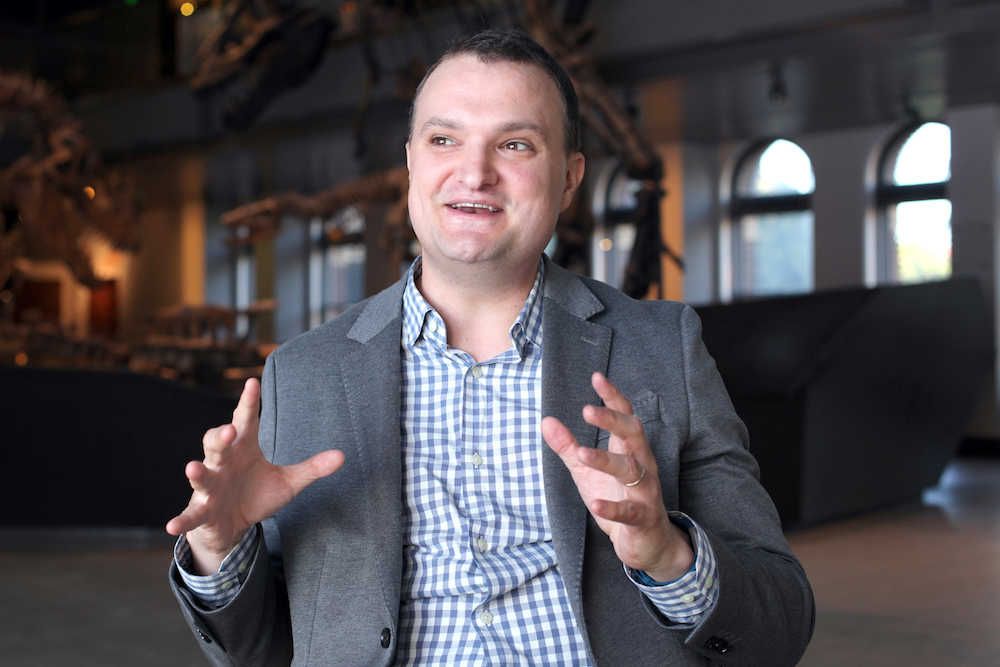
Photo by Aaron Salcido.
Jeffrey Guhin is an assistant professor of sociology at UCLA. His first book, forthcoming from Oxford University Press, is a comparison of two Sunni Muslim and two Evangelical Christian high schools. Before joining a Zócalo/Natural History Museum of Los Angeles County panel, “Are Americans Turning Against Science?,” held at the Natural History Museum in Exposition Park, Guhin spoke in the greenroom about his memories of Damascus, why he considers kindness beautiful, and how he passes the time when he is stuck in traffic.
You used to be high school teacher. What do you miss about teaching high school?
I miss the intensity of it, the meaningfulness of the interaction with students, the capacity to create really intense and deep relationships. As a college professor, I definitely can have meaningful relationships with students, and I do, and I’m very grateful for that. But especially because I give mostly large lecture classes to undergraduates, it’s much harder to find. I probably had more hours in a week with certain high school students than I do in a semester or quarter with some undergrad students, so you really have that kind of deeply meaningful connection that makes teaching so amazing.
What’s the best book you’ve read in the past year?
[I am] a wannabe novelist, and so probably a novel called The Thing Itself. Adam Roberts is the novelist. It’s amazing. It checks all my nerd boxes. It’s a science fiction novel about [the philosopher] Kant and aliens so it’s great. Kant essentially makes this argument that we never really have access to the thing itself; we never really see something though. What if our artificial intelligence ultimately gave us access to the thing itself? We could then manipulate reality. It’s a clever, beautiful novel that is really, really sad and wise.
You’ve conducted a lot of ethnographic research. What do you think is the most important thing for ethnographer to be aware of as they start projects?
It sounds stupid but it’s true: Write it down. There’s a lot of other stuff, but the important thing is to write it all down. You come home, you’re exhausted, you’re tired, you might feel anxious, you might wanna watch TV and hang out with your partner.
What teacher or professor changed your life, if any?
The cheesy answer is my wife, who is a high school teacher. Of the actual teachers I’ve had, it would be my sophomore and senior English teacher, Mrs. Brayman, who really encouraged me, taught me, and saw things in me that I didn’t see in myself. I try to teach like her.
How do you pass the time when you’re stuck in traffic?
I do a lot of things that are very dorky. I’m sort of obsessed with Pimsleur language lessons. So I do those a lot. I also do books on tape. I’m listening to a biography of Adam Smith right now, and then sports radio. I’m obsessed with the Lakers.
You studied in Damascus. What’s your most striking memory of the city?
The weight of history. I lived a few blocks [from] where [the Apostle] Paul was baptized, and just thinking about St. Paul showing up in Damascus—it was already an ancient city 2,000 years ago when St. Paul showed up. The oldness of it was the most amazing. That and the falafels, which I like. I could eat falafels every day.
What do you consider beautiful?
Increasingly it’s kindness. The “Deadwood” movie just came out. It was a great HBO show that was canceled a while ago, and they just did a movie. My partner and I rewatched it, and there’s this one scene where these two minor characters are both going through tremendous pain. And they’re in a town where there’s not a lot of nice people. [There’s] a lot of cruelty in this town, and you get to see them being kind to each other. And not in a cheesy way, or a corny way. Just basic kindness. And, as a sociologist, I know about the need for structural change; I know about the need for justice. I know that basic kindness isn’t enough. Just being nice to each other is not sufficient, [but] increasingly I find kindness rare and beautiful.
If you could only take one more journey, where would you go?
I guess I’d go back to New York City. That’s where I spent most of my twenties. And I’d be sad to die, never going back to New York.
Where do you go to be alone?
As an academic I specifically have that problem, of being alone most of the day. I’m alone in my office. When I’m feeling alone, I walk to the beach. That’s less of a problem for me now. When I lived in NYC, I would get home after 3 [in the afternoon] after teaching high school and take long walks in the city.
What keeps you up at night?
It’s a combination of a variety of things. There’s the straightforward work stuff—like getting these deadlines in on time, worrying about my students, worrying about writing deadlines. Last night it was these chants at the Trump rally. I think it’s naïve to say this isn’t America. This has been a real strain of America for a long time. Nonetheless, it is very depressing to have a president so willing to embrace that kind of rhetoric. I’m definitely worried about engaging and encouraging this side of the American identity.



